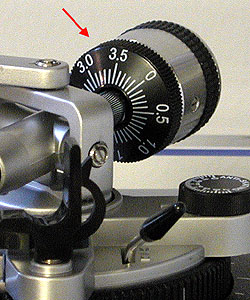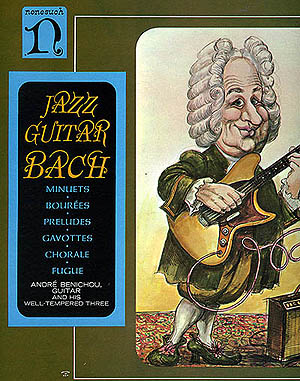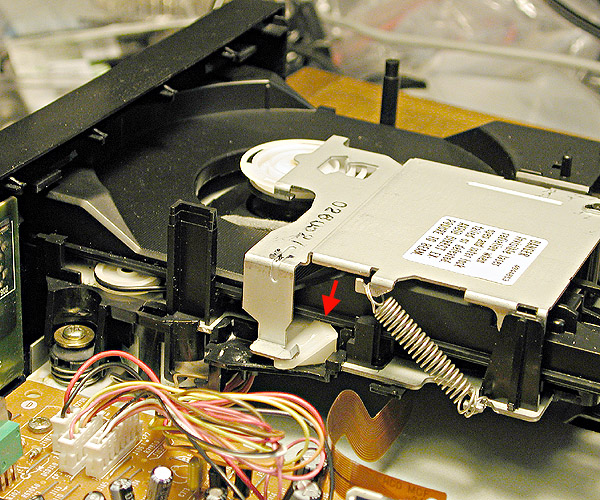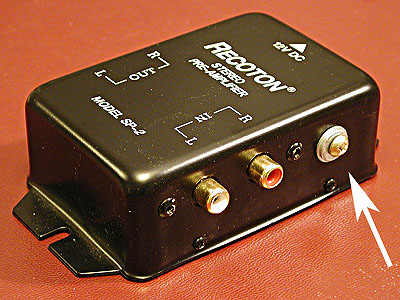 |
|
|
Popular topics on this page:
Astrophotos:
Mars Mars
Venus
Saturn
Pleiades Pleiades
Orion
What is gopher wood?
C. S. Lewis and Narnia
Michael Novak on the nobility of business
CD player: drawer does not open or close (repair notes)
Adding a ground screw to a Recoton phono preamp
Dual cassette-deck cleaning tip
Audio-Technica AT-PL120 turntable
Sound Blaster overloads on line-level input
Sherwood RX-4105 receiver
Scroll down or press Ctrl-F to find others, or check previous months.
BOOK SALE - I'm selling off some scholarly books via Amazon Marketplace. Have a look!

|
2005
December
28-31
|
Dominique
What is the point of contact between medieval church history and 1960s American popular music?
A hint: Belgium.
Not much of a hint, was that? What I'm actually referring to is the song "Dominique," performed
by a nun who called herself
Soeur Sourire
(Sister Smile) and was known in English as The Singing Nun.
It has a catchy tune, and since it's in French (rather hard French), most Americans hadn't a clue
what it was about, yet it made the Top 40.
It's about the efforts of St. Dominic de Guzmán
to combat the
Albigensian heresy.
The Albigensians were a strange cult who advocated starving oneself to death, or at least
not marrying or having children, so that Homo sapiens would die out.
St. Dominic was worried when he saw people accepting Albigensianism without even realizing
that it was wildly non-Christian.
He decided some education was in order, so
he founded the Dominican order of preachers and teachers
– monks and, later, nuns – which soon recruited such
brains as St. Thomas Aquinas and did more to raise the intellectual level of Christendom
than anyone since St. Augustine.
But we were talking about the song.
You can hear a snippet of it
here.
Here are part of the lyrics, with my own rather literal translation not intended to be sung:
Chorus:
Dominique, 'nique, 'nique,
S'en allait tout simplement
Routier, pauvre et chantant.
En tout chemin, en tout lieu
Il ne parle que du Bon Dieu,
Il ne parle que du Bon Dieu.
A l'époque où Jean-Sans-Terre
d'Angleterre était le roi,
Dominique notre père
combattit les Albigeois!
(chorus)
...
Ni chameau, ni diligence
il parcourt l'Europe à pied,
Scandinavie ou Provence,
dans la sainte pauvreté.
(chorus)
|
Dominic, 'nic, 'nic,
Went along in simplicity,
A road traveler, poor and singing.
On every road, in every place
He talks about nothing but the good Lord,
He talks about nothing but the good Lord.
At the time when John Lackland
of England was the king,
our father Dominic
fought the Albigensians!
...
(With) neither a camel nor a coach
he tours Europe on foot,
Scandinavia or southern France,
in his holy poverty.
|
(Surprise: diligence in French doesn't mean "diligence," it means "stagecoach.")
Soeur Sourire's record was recently remastered
as a CD,
and it's on my wish list.
The other day I got hold of the original 1963 LP album, not in perfect condition, but
enough to bring back a lot of memories – because I had a 45 rpm record of the song
back when it came out. I was 6 years old and I think this was the first popular music I had
ever paid any attention to.
What has been interesting is matching up the real French words with my memories of the
strange sounds of the language.
I remember a word (?) that sounded like "equinox" – it must
have been -ie ou Provence.
And
combattit les Albigeois definitely sounded exotic to my young ears;
so did parcourt Europe à pied.
As I try to sing the song in French today (and be glad that you don't have to listen!),
I find even il ne parle que du bon Dieu to be something of a tongue-twister, with those
alternations between labial and dental consonants.
Permanent link to this entry
Miscellany
Today (Dec. 29) I released a new version of
EXIFLOG,
my utility that reads a bunch of digital camera image files (in several formats) and
generates a checklist of pictures, sorted by date and time, with exposure information for
each. The new version also handles AVI video files.
Online shopping wins: After going to Atlanta the other day to try to shop, I'm
convinced that online shopping is the best thing since sliced bread.
Remember what Sears, Roebuck & Co. brought to America in the 1920s?
Mainly, the fact that they actually had the stuff – you could order from
a large inventory and pick the exact items you needed.
Shopping in stores frustrates me because what I need is so often not there,
even if it is something the store has carried regularly.
With modern online shopping, we can find out positively whether the item is in stock
(and whether we're getting a good price on it) before pressing the button.
Even overnight shipping costs less than driving to Atlanta, especially when
your time is worth something. In that case, overnight shipping costs
less than spending half an hour on a probably fruitless trip to the mall.
Happy new year! Unless there are unexpected major events,
I'll close out 2005 now and see you in the new year.
Don't forget the
leap second that is being inserted at the end of
the year, necessary because our clocks are now more accurate than the earth itself!
Leap seconds are rather inconvenient for computers that run scheduled events at midnight,
because when there is a leap second, midnight comes twice, one second apart.
I think it would be wiser to insert them at an arbitrary time that is not a round number,
such as 2:37 a.m., when computer events are unlikely to be scheduled.
Permanent link to this entry

|
 |
2005
December
27
|
Can't set the volume low enough
Sound Blaster overloads on line-level input even with recording level set to bottom of scale
 After we set up the new receiver (described below), Melody's computer had trouble making
recordings from it. The input level was too high, even with the control set at the bottom
of the scale. We had had a similar problem with the previous receiver and solved with with
some resistors in the cable, but this time I wanted to dig more deeply and solve it correctly.
After we set up the new receiver (described below), Melody's computer had trouble making
recordings from it. The input level was too high, even with the control set at the bottom
of the scale. We had had a similar problem with the previous receiver and solved with with
some resistors in the cable, but this time I wanted to dig more deeply and solve it correctly.
With an oscilloscope, I measured the overload as occurring at 3 V peak-to-peak or 1 V rms, which
is only 3 dB above the specified 500 mV. The problem isn't with the input signal.
Then I compared Melody's Sound Blaster to the one in my computer. Mine will attenuate all the way
down to zero, and a 10-volt input doesn't faze it.
At that point, inspiration dawned. Maybe it's a driver problem.
Melody's computer was using the Microsoft Windows XP driver for the Sound Blaster.
I downloaded the manufacturer's driver from
www.creative.com and
installed it, even though it was older.
Success! No more level problems.
By the way, you can create a shortcut directly to the Windows recording control
(as opposed to going to Volume Control and then switching to recording mode).
Just make the shortcut point to: sndvol32 /r
Permanent link to this entry
A good $95 stereo receiver

For Melody's system we also decided to invest $95 (the sale price at Circuit City)
in a Sherwood RX-4105 stereo receiver.
It's amazing how far they've come in a couple of decades.
When I first turned this receiver on, there was so little hum or hiss that I thought
it was dead. (The SNR is 95 dB.)
The sound, of course, is excellent as far as we could tell with our rather
inadequate speakers.
The output is rated at 105 watts per channel, 0.05% THD. I can remember when
people were still saying 1% THD was low enough – but then, I'm very old.
It's also amazing how little it cost. Its predecessor, a Nikko STA-5010, cost about $140
in 1973. That's $800 in today's dollars.
I plan to keep up the Nikko as a working antique but not use it for making recordings because
there's too much risk of a loose connection in its sliding-contact switches.
This receiver is ideal for our computer setup because, like many newer receivers, it supports
two tape decks ("TAPE" and "VCR"). The "VCR" is actually a computer (Line In and Line Out)
and the "TV/AUX" is actually the turntable with built-in preamp. Only "TAPE" and "CD" really
are what the labels say.
And the remote control is very handy.
But speaking of labels, the one fault I find with this receiver is that the front panel
labeling is almost invisible unless you bring along a strong light and a magnifying glass.
We actually added some homemade tape labels so we can see what we're doing.
I know there's a strong tradition of having audiophile equipment look like black boxes...
maybe some people feel it sounds better that way.
I also wish these digitally controlled stereos would let you rename the inputs in the firmware,
so that (for instance) "Computer" rather than "VCR" would light up on the display when I selected
the input that is connected to the computer.
Permanent link to this entry
Miscellany
Christmas continues: I decided my entry for Christmas Day was too drab,
so I redecorated it and added a picture.
Fried:
Yesterday Melody and I went to Fry's Electronics in Duluth, Georgia, and concluded that
the store is no longer
what it initially promised to be.
Interesting and useful items are not being restocked (especially electronic components),
and the prices on audio equipment were (in our limited experience)
not as good as Best Buy and Circuit City.
Despite its size, that enormous store is no longer a reliable source of anything hard to find.
We went over to
Micro Center and found some audio cables that Fry's didn't
even know where to look for, as well as lots of employees who could answer questions instead
of just replying, "What is that?"
[Note added Dec. 30: On a second trip, Fry's redeemed itself somewhat.
The inventory was still depleted but much better organized, and we got Adobe Premiere Elements,
a video editor, for $40 after rebate.]
Personal safety tip of the day:
Don't carry your Social Security card in your wallet.
When was the last time you actually needed it?
Only bring it along when starting work at a new job, and even then,
they probably won't need to see the card.
But a thief who gets your Social Security number can
easily impersonate you
and give you lots of grief.
Uncapped?
I finally found out what the British (who don't have baseball) call a baseball cap.
They call it a baseball cap, and they have lots of them.
Unfortunately, baseball caps – even
the one that I wear –
are being
banned in British Internet cafés
because they're associated with obnoxious behavior.
Me? Obnoxious?
Dog of the day:
Above the new turntable we have of course hung up a print of
Nipper listening to
His Master's Voice.
If you don't know who Nipper is, your knowledge of 19th-century canine audiophiles is not encyclopedic.
Nipper even rates his own entry in Wikipedia.
Permanent link to this entry

|
 |
2005
December
26
|
Music licensing: Problem not solved
Melody is having a problem today with the digital license management of some
music downloads she bought a couple of years ago.
I think this reflects one of the big unsolved problems of computer
technology today.
Sure, people think they've solved it, but the solutions are unsatisfactory.
Part of the problem is of course that the Internet makes indiscriminate sharing
easy. People can put files on the Web (or on a secretive P2P network) and give away
millions of copies. This is altogether on a different level than someone making
one cassette copy of a record to give to a friend – a practice that the industry
tolerated because it often led eventually to more sales.
Indiscriminate file sharing can destroy the paying market for a work completely.
On the other side, the music industry has a long history of viewing
every technical advance as a threat.
The phonograph was going to kill off live music.
Radio was going to kill off the phonograph.
Then home tape recording was going to kill them both.
TV was going to kill the movie industry.
VCRs were going to kill TV.
And so forth.
A further development is that today, for the first time, home copying of audio
is lossless. When you copy a CD, you don't introduce hiss or reduce the fidelity.
The reason the record makers didn't mind when we made the occasional cassette tape
is that we were losing quality. Not so with computer audio.
So where does that leave music today?
Somewhat in the same position as the software industry 20 years ago, when it
was experimenting with copy protection and dongles.
Fortunately for all of us, the copy-protected 5 1/4-inch software diskette
was killed off by the IBM PS/2 in 1987, which had diskettes of a different size
and required us to copy all the older disks in order to use them.
I wish somebody would do something like that for digital music today:
Create a new medium with a market so big and so powerful that nobody can ignore it,
but at the same time, incompatible with all existing copy-protection schemes.
I'm not in favor of illegal copying, but attempts to prevent it
invariably backfire and impede legitimate use.
The vendors of 5 1/4-inch copy-protected diskettes destroyed their own
market when the diskette format changed.
Or even sooner; some of the earliest copy protection schemes would only work on
one particular model of Tandon diskette drive!
(Melody predicts something like this in 3 to 5 years, when the first generation of
pocket MP3 players bites the dust and people find that they can't download the
same files to a new player.)
I like living in a world of 99-cent downloads.
But the downloads often have quirky conditions attached to them.
What happened to Melody is that her laptop computer failed, losing all the disk contents.
She got it fixed, and although she still had the music files (from backup), she had lost
the secret license keys that were hidden somewhere in the operating system.
All the vendors have been cooperative with her except buy.com,
which doesn't seem to understand why she won't pay a second time to license the same music to the
same computer used by the same person.
I have a bigger worry about digital rights management.
What if the license management scheme expires or goes away?
Then we'll all have files we can no longer listen to
(until somebody cracks them).
There are people who can still play Edison phonograph cylinders from 1905 –
but how many of the MP3s of 2005 will simply be unplayable 50 years from now?
How much music will be lost forever, even though top-quality recordings of it existed
and are still on people's disks?
My proposal? Crack down hard on indiscriminate sharing (e.g., Web and P2P) and
unauthorized resale. But punish only the guilty.
And vote with your pocketbook if you don't like somebody's licensing scheme.
We don't have to support people's shortsighted practices if we don't like them.
Permanent link to this entry

|
 |
2005
December
25
|
Merry Christmas!

For unto us a child is born,
unto us a son is given:
and the government shall be upon his shoulders:
and his name shall be called
Wonderful, Counsellor, The mighty God,
The everlasting Father, The Prince of Peace.
Of the increase of his government and peace
there shall be no end,
upon the throne of David, and upon his kingdom,
to order it, and to establish it with judgment
and with justice from henceforth even for ever.
The zeal of the Lord of hosts will perform this.
That familiar passage is Isaiah 9:7-8, except that we do not usually read the last sentence
about the zeal of the Lord.
Yet those words are crucial.
The Incarnation and the Gospel are all about God's determination to
reconcile us to Himself, whatever the cost.
As C. S. Lewis put it, "man's search for God" is like the mouse's
search for the cat.
The usual human search is for a way to get away from God.
Consider, for example, how often trendy New Age "spirituality" starts
out by dethroning the Almighty.
Nonetheless,
in spite of our efforts to avoid Him,
Christ the Saviour is born. Merry Christmas!
Permanent link to this entry

|
 |
2005
December
24
|
Mars retreats...
and Venus approaches, and the Pleiades are right where we left them,
complete with dust clouds around some of the stars.
These pictures were taken on the evening of December 21.
Merry Christmas!



Permanent link to this entry

|
 |
2005
December
23
|
Stereo repair and an FM transmitter
I think it has been more than 5 years since I've been able to spend two whole
days in my home workshop doing things of interest to me rather than
working for the University or a consulting client.
Yesterday and today were two such days.
I worked on three stereo systems and wrote two copious pieces of documentation,
one on
how to
digitize records and tapes
and one on
how to
convert the phono input of an amplifier to line level.
The usefulness of the first one is obvious. It's written both for Melody and me
(as a quick reference guide to our own procedures) and for anyone else who
happens along.
As for the second one: Most stereo systems no longer include a turntable, or if they
do, it has its own preamp. So the low-level phono input goes unused.
But we need all the line-level inputs we can get.
In particular, Melody wanted another one so she could plug her iPod – sorry,
her Creative Labs MP3 player – into the big stereo. Done today,
and documented in copious detail on line.
Along the way I also did an FM alignment of our Kenwood receiver.
It was trying to tell me all the stations were 0.1 MHz higher than their
real frequencies. And actually, they didn't sound too good at that setting either.
I realigned the detector and now the receiver displays correct frequencies and sounds excellent.
I also adjusted the
Ramsey low-power FM transmitter
that we sometimes use to relay music throughout the house.
There is now a radio station in the area on its frequency, 105.1 MHz, so in order to
be a good neighbor, I needed to move it to an empty channel.
And Georgia doesn't have many empty channels!
Fortunately, I was able to approach the problem the professional way: go into
the FCC's database
to find out how many stations within a specified radius of me were on
specific frequencies.
It turns out that 102.5 MHz is vacant for 60 miles around me, and the
adjacent channels (102.3 and 102.7) are also vacant for a reasonable radius.
So our transmitter is now on 102.5.
One other audio matter.
Internet radio works.
To my surprise, I'm able to get a CD-quality audio stream from
BBC Radio 4,
which will broadcast the Festival of Lessons and Carols
from Cambridge tomorrow at 3 p.m. EST.
[Note added Dec. 24: We missed it.
It was 3 p.m. GMT, not EST. Oops!]
It will reach us as follows: by Internet (details unspecified)
from the BBC in London to
Bellsouth in Atlanta;
by fiber optics (I think) to the nearest DSLAM;
by DSL line to our house;
by wireless network (2.4 GHz) from upstairs
to downstairs;
by audio cable from my laptop into the stereo;
and then we may send it out on 102.5 MHz FM.
Alexander Graham Bell's mind would have boggled.
Permanent link to this entry

|
 |
2005
December
22
|
New audio pages
Below you'll see more notes on audio topics. Rather than continue piling up this kind of material here,
I've started a new set of pages
about audio technology. Enjoy!
Permanent link to this entry
New turntable


[See also April 22, 2006.]
Our new
Audio-Technica AT-PL120
turntable has arrived and sounds great.
It will even play some badly pressed records from the early 1980s that are almost unplayable.
I heartily recommend
this deal
while it lasts – you can get a $300 turntable for $150.
There's just one minor problem, to which I was alerted by published reviews, and which I fixed.
The stylus pressure calibration dial (red arrow in second picture)
turns so freely that it doesn't really calibrate anything.
It's supposed to stay put relative to the counterweight until you deliberately turn it.
I fixed that by popping it off and inserting some artist's tape (white paper tape) inside it
to make it grip more tightly.
Permanent link to this entry
Weird music of the day

|
|
To celebrate the arrival of the new turntable,
Melody gave me the oddest record she could find
that she thought I might like, namely
André Benichou's Jazz Guitar Bach.
A quarter century ago I borrowed this album from
a friend and made a cassette tape of a few tracks.
Ever since, I think Melody has been awaiting the
rest of it. Today we found it.
To hear a small sample, click
here.
That piece of music is a Bourrée, BWV 996, and according to the album notes,
it may not really be by Bach. Oh well...
Note added Dec. 22: The joke's on me.
We already had a copy of this record.
We have so many records – including a huge number given to us
by my uncle – that we don't know what we have.
|
Permanent link to this entry
Not an efficient market
In economics, an efficient market is one where people have good opportunities
to comparison-shop, so the deals they actually make are close to the best they
could possibly make.
One quick look at
MusicStack tells us that the market for used records
is not efficient.
As of today, prices for Jazz Guitar Bach in excellent condition
range from $9.90 to $129.36! Melody got it for $8.
Of course, MusicStack is a powerful force tending to make the market efficient.
Permanent link to this entry

|
 |
2005
December
20-21
|
Financial fireworks
If you like lively reading, look at the
public comments
that have been filed in response to a proposal
to improve the regulations that implement
the Truth in Lending Act.
One of the key proposals is that credit card statements should show the
consequences of making only the minimum payment.
My own comments
address this on a technical level, pointing out that when the balance declines,
the minimum payments decline too, and the debt never gets paid off.
Note also
this posting
from a credit card processing company arguing that
the industry can't afford to reprogram the computers
to calculate the effects
of making only the minimum payment. Bah humbug!
But look at all the other horror stories and rumblings of discontent that
were sent in.
Many of them ask for new laws and regulations.
The one from Consumers Union
is a good statement of what seems to be wrong with the credit card industry
(and they share my opinion that that a lot of it would clear up if there
were a national usury law, because if super-high rates were forbidden altogether,
all the tricks for imposing them would have to go away).
There are also filings from Visa, MasterCard, and Capital One, as well as a Congressman,
a state attorney general, and the national Comptroller of the Currency,
as well as a lot of irate individuals.
Permanent link to this entry
Limitations of vinyl records
See this useful
essay by a recording engineer.
Vinyl LP records are certainly not the perfect
recording medium; the people who make them have to struggle
with lots of constraints. Clipping of the high notes is a serious problem,
especially if the grooves are extra close together
because someone wanted to put a lot of music on one side of the record.
I hadn't realized this before, but the spacing of the grooves is not standardized.
(Why should it be? The stylus follows the groove wherever it goes.)
The grooves are spread out, so that no matter how much or how little music you've
recorded, it fills a side of the record.
So if one side of an album has about 15 minutes of music, the grooves are wide apart
and can swing far to each side; that is, they can record high-level audio.
If you want 30 minutes of audio, the grooves have to be closer together and
the audio levels have to be lower.
Permanent link to this entry
Dual cassette deck cleaning tip
This worked with my JVC dual auto-reverse cassette deck, and it may work with others.
I discovered that all four capstans rotate (though only one is engaged against
a pinch roller) whenever a tape is playing in either half of the deck.
That means you can clean capstans by playing a tape on the other side of the deck
while the one you want to clean is stopped and has its cover open.
Hold an alcohol-soaked rag against the rotating capstans.
Permanent link to this entry

|
 |
2005
December
19
|
Vesperae cum canibus
Yesterday, Melody was off on a trip and circumstances prevented us from getting to church,
so we planned on having evening prayers (Vespers) as a family.
Due to more circumstances, Vespers got postponed until tonight.
At Cathy's request, we had Vespers in Latin, as we often do at Christmas.
It's a good way of getting in touch with some Christian history and
learning the Biblical contexts of familiar phrases such as Ave Maria
(Luke 1:28) and
Gloria in excelsis Deo
(Luke 2:14).
There are now three Latinists in the family, and Melody is picking the language up
through conversation.
Well... It went very elegantly until we started singing Veni, veni Emmanuel.
Then Babbage, our dog, decided he needed to sing along, and Tycho wanted to help him.
We put them outside immediately.
Permanent link to this entry
Some notes on fixing stereo equipment
One of my vacation projects is to
overhaul some of our older audio equipment.
Here are some case notes.
CD player: drawer does not open or close
Our vintage 1986 (!) Emerson CD160 compact disc deck would no longer open its drawer.
A priori I thought this must be a failure of the plumbing O-ring
(11/16" i.d., 1/16" thick)
that I had used to replace a small belt about five years ago
to cure the same symptom.
No; the O-ring was intact, although I did replace it just to be safe.
The problem turned out to be gummed up lubricants, especially
at the place marked on the picture – a wedge-shaped moving part that
slides to open the clamp (unclamp the CD) as the drawer opens.
I put a tiny drop of silicone oil on every lubrication point I could find,
and at the place marked in the picture, I carefully removed all the old
grease; removing the old goo was more important than adding a new lubricant.
For new lubrication I used silicone oil and a very small amount of Zebco
fishing reel grease, both of which are safe for plastic.
At this point, if the CD player fails again in a few years, I won't be upset;
it's older than some undergraduates!

On CD player repair see also
Sam Goldwasser's notes.
I do not have any further information about repairing this item
and cannot answer further questions about it.
You can get knowledgable advice by posting your questions in
the newsgroup sci.electronics.repair.
Permanent link to this entry
Adding a ground screw to a Recoton phono preamp
 Modern stereo amplifiers don't have phono-level (5-millivolt) inputs, only line-level (500 millivolts).
That means that if you want to use a turntable with a modern amplifier
(or with a computer sound card)
you need a preamplifier in between.
The difference is not just level; it's also
RIAA equalization.
The signal from the phono cartridge needs a strong treble cut.
Modern stereo amplifiers don't have phono-level (5-millivolt) inputs, only line-level (500 millivolts).
That means that if you want to use a turntable with a modern amplifier
(or with a computer sound card)
you need a preamplifier in between.
The difference is not just level; it's also
RIAA equalization.
The signal from the phono cartridge needs a strong treble cut.
The turntable has 3 wires coming out of it: the left and right channel cables (shielded) and
the ground wire, which provides extra protection against hum and noise.
But a low-end phono preamp
usually has no place to connect the ground wire. What are you supposed to
do with it, then?
My solution: Drill a hole in the case and put a sheet metal screw into it, with a couple of washers.
Use that as the ground connection.
This requires opening the case, of course. Never drill into a piece of equipment without
knowing what's inside. Remove the metal shavings carefully after drilling.
It works. Much less hum!
Permanent link to this entry

|
 |
2005
December
18
|
Christmas is coming...
Happy
Fourth Sunday in Advent!
An afterthought about the controversy over "Merry Christmas":
When I wish someone a merry Christmas,
I'm not saying anything about his
religion.
I'm practicing my own.
Permanent link to this entry

|
 |
2005
December
16-17
|
The trouble with...
The trouble with UPS: "Scheduled delivery" may be a boon for businesses
receiving their raw materials "just-in-time," but what it means for the rest of us is that UPS
will intentionally delay a package (holding it in a warehouse) in order to
guarantee that it's not delivered before the scheduled date.
If you pay for second-business-day delivery, you'll definitely not get the
package on the first business day even if a weekend has intervened.
The motive of course is to keep people from getting faster service than they
paid for. First-business-day delivery costs more.
At least that's what I infer from tracking several packages over the past couple
of years, most recently our turntable, which is spending the weekend in Edison,
New Jersey.
The trouble with Radio Shack: Every 1970s stereo has a pair of big
3200-μF capacitors which are now due for replacement.
Radio Shack stocks a 4700-μF capacitor that is a good substitute
(in fact an upgrade).
But because it's a slow-selling item, somewhat bulky in the parts drawer,
each Radio Shack store stocks only one of them at a time.
I am not sure this is Radio Shack policy, but it's certainly what I observed
at two stores today, and I don't think the space in the drawer was big enough
to hold two.
To fix one stereo, you need two Radio Shacks.
[Note added Dec. 18: This may have been
a mere coincidence. At another, larger, Radio Shack, I found five of them.]
Tomorrow's project is to do a lot of maintenance on audio equipment.
I'll probably document some of it on a web page.
Permanent link to this entry

|
 |
2005
December
15
|
More audio notes
We ended up buying a new turntable, but not the Ion iTTUSB.
Instead, we got
this remarkable
deal on an Audio-Technica refurb, with preamplification and a very good cartridge.
At least we hope we got it; it may be out of stock by now.
I came across
this
interesting thread about why music doesn't sound very good when you record it off the radio.
Radio stations want to have their own distinctive sound rather than making your radio sound like a
CD player. This probably doesn't apply to classical stations.
A coming project: "Phono input is line level."
(That's what the label on the back of the amplifier is going to say.)
I'm going to modify two of our three stereo
amplifiers to bypass the phono preamp. This is for using an amplified turntable and also for connecting
other devices, such as an iPod, to the phono input.
Today was the last meeting of my engineering class (Advanced Microcontrollers), and we built a
music box that plays the last few bars of Georgia's fight song.
It uses a PIC16F84 and runs off three 1.5-volt batteries.
The students did the firmware as a team project, in 3 teams, and we chose the best-sounding one.
There's some interest in mass-producing them and selling them as a fundraiser.
Permanent link to this entry
This "Happy Holidays" business is getting out of hand
While I'm glad to see people pushing to
call Christmas by its rightful name,
some people are acting positively unreasonable.
I'm a Christian, and I don't mind at all if people say "Happy Holidays" to me.
I celebrate 3 holidays, Thanksgiving, Christmas, and New Year's.
That's 3 happy holidays.
And I normally say "Happy Holidays" to people who celebrate Hanukkah,
the Winter Solstice, or something else.
There are two things I do find objectionable:
(1) People claiming to be "offended" when someone, meaning no harm,
says either "Merry Christmas" or "Happy Holidays" to them.
Is anyone really offended by these things, or is this a
fiction of the politically hypercorrect?
(2) People refusing to call December 25 "Christmas."
In my house we don't have a "Holiday Tree" or "Holiday Presents."
We have a Christmas tree and exchange Christmas presents on Christmas.
I think the second of these – which swept through the advertising
industry a couple of years ago – is what set people off.
Taking the name of Christmas off of things to which it properly belongs
looks like an anti-Christian gesture. That's what irritated people.
But even then, maybe it was misguided reverence that led to the change.
Maybe they wanted to avoid dishonoring Christ, so they took His name
off their commercial endeavors. Unfortunately, it
gave the impression
they were trying to suppress Christianity.
Permanent link to this entry

|
 |
2005
December
13-14
|
A record player for the rest of us
 Today's handy gadget, pointed out by Jeff Duntemann:
a turntable for your computer.
The
Ion Audio iTTUSB
has a preamp and a USB sound card built in.
It outputs phono-level analog, line-level analog, and digital signals.
It also has a line-level input for digitizing other audio.
Today's handy gadget, pointed out by Jeff Duntemann:
a turntable for your computer.
The
Ion Audio iTTUSB
has a preamp and a USB sound card built in.
It outputs phono-level analog, line-level analog, and digital signals.
It also has a line-level input for digitizing other audio.
One extremely well-chosen feature is that it uses a DJ-type cartridge with a
tracking pressure of about 4 grams.
That means it stays in the groove when there's a scratch on the record, or when
a heavy person walks by downstairs.
We've had a whole generation of turntables
with P-mount cartridges that track at 1 gram.
This is to minimize wear, but these ultralight cartridges work well only with
records that are in pristine condition. They bounce out of the groove or, worse,
stay in it while failing to track, producing distortion on the loud, high notes.
And that really puts wear on the records.
The iTTUSB sells for about $140 if you can get it.
Can you get it?
Of course not! It's sold out everywhere. Melody wants one, presumably for Valentine's Day,
not Christmas.
By the way, it's not too hard to make one of these.
In the first place, do you actually need USB digitization in the turntable,
or would it suffice to plug a line-level audio cable into your computer's
sound card, which is probably better and faster than a USB one?
Turntables already come with preamps
built in, which is a Good Thing because it eliminates the high-impedance, low-level, hum-prone
phono cable going to the amplifier.
An example is the Teac P-A688.
Its cartridge.
is apparently Audio-Technica, half-inch mount, 3.5 grams (a reasonable compromise).
Also, this Teac does not have a pitch (speed) control.
Looking around quickly, I see another preamplified turntable from
Radio Shack
($80, very similar to the Teac, same cartridge; again, no pitch control)
and, for a higher price,
Audio-Technica
(under $200 street price, including a good DJ cartridge, including pitch control and strobe).
There are probably many more.
If you have a preamplified turntable and a computer with a sound card,
you can play records directly through the
computer's speakers. As I understand it, that may not be possible with Ion's USB turntable;
I don't know if there's a way to feed the already-digitized audio to the computer's speakers.
Maybe so; maybe not.
In any case, you can make the equivalent of the iTTUSB by pairing any preamplified turntable
with a USB audio device such as
this one.
Why buy a turntable in 2005?
Because it's a mechanical device, not electronic, and in an old one,
all the lubricants and belts are likely
to have deteriorated, as well as the mechanical compliance of the cartridge.
And because building the preamp into the turntable is a Really Good Idea, and a modern preamp
(with low-noise opamps and no 30-year-old electrolytic capacitors) will outperform anything built
thirty years ago.
While doing a bit of transcribing records to CDs this past weekend, I've learned that it is
very important to wash the record by soaking it in water with some dishwashing detergent,
then rinsing in plain water.
This greatly reduces pops and crackles; it seems to be necessary even if the record was
perfectly clean when put away 20 years ago. Maybe some kind of impurity from the paper sleeve
gets into the grooves.
Permanent link to this entry

|
 |
2005
December
12
|
Hasty notes about obscure music
Readers who recall my interest in an
obscure band
called The Current Event will be glad to hear that I've obtained a
fresh copy of their Simon & Garfunkel album, New Zealand edition,
which is indeed a different pressing than the North American one,
and also a well-preserved copy of their Beatles album.
I'll post details soon, just in case somebody else is ever trying
to track them down.
Nothing is too obscure for this blog!
Let me recommend Adobe Audition for cleaning up recorded audio.
Its noise filter seems to produce considerably nicer-sounding output
than GoldWave's. More about this soon.
Permanent link to this entry

|
 |
2005
December
11
|
The real meaning of Christmas?
Happy
Third Sunday in Advent!
I hope some of the humor in
this
news item is unintentional...
A fan of the actress Paris Hilton made a "Christmas" display consisting mostly of pictures of her.
Many felt this to be in bad taste.
And according to CNN,
Ron Raffonelli, 65, said he would be upset if his young grandchildren came to associate Christmas with a naked woman. He'd prefer the kids to think of Santa Claus.
After all, Raffonelli said, "He's been around longer."
Let's see now... Christmas commemorates the birth of whom? Neither Paris Hilton nor
St. Nicholas,
the last time I checked.
Although admittedly I share Mr. Raffonelli's preference, if I have to pick one of the two!
Permanent link to this entry

|
 |
2005
December
10
|
Michael Novak on the nobility of business
[Minor revisions Nov. 12.]
Yesterday I read, at one sitting, Michael Novak's
Business
as a Calling.
Novak's thesis is that a career in business is a noble thing.
All too often, we are told that business consists of disreputable, selfish money-grubbing, and
that non-business careers (in academia, the arts, or even government) are nobler by comparison.
According to Novak, this disdain for business reflects prejudices and misconceptions, among them:
- The aristocratic prejudices of the people who used to support academia and the arts.
- Simple ignorance of the fact that business creates wealth, creates jobs, and overcomes poverty.
Far too many religious and political idealists seem to believe that all
wealth is obtained by taking money away from someone else.
- Confusing people's economic behavior (studied by economists) with their total behavior.
Economists assume that people want money. They do not assume that money is the only thing
people want, or that they want it just for the sake of having it.
- The economics of the agricultural era, before 1900 and maybe 1800, before the
rise of corporations and business ventures; maybe even the economics of the Middle Ages.
(This seems to loom large in the economic advice given
by churches.)
What's so great about business? Several things...
- It is the antidote to poverty. If you want poor people to have jobs,
then business is what you are in favor of, whether you realize it or not.
- It promotes some moral virtues.
A fair market imposes honesty and diligence on everybody
because you can't succeed any other way.
- It discourages the sin of envy.
Envy is a feudal sin, not a capitalistic one; in a land of opportunity,
nobody is locked out of economic success.
- It promotes some intellectual virtues too, especially practical realism.
There are no postmodernist entrepreneurs.
"Believe anything you want" is the kind of nonsense that can only exist in academia.
In the business world, you have to test your beliefs constantly against the real world.
That doesn't mean business is automatically 100% good, but Novak argues forcefully
that capitalism is better than the known alternatives.
In particular, a market economy works hand-in-hand with political freedom.
And it helps divide up power. Novak argues that it is much better
for a country to be run by
a large number of rival interests (some of which are corporations) than by a
simple majority. Moderately powerful special interests can be a good thing;
they make it impossible for a political change to wipe out a whole segment
of the economy at once.
Permanent link to this entry
Spelling error of the day
Seen on an ISP's system status page:

Poor unloved ISP!
They must have meant "customer-affecting outage" or something like that.
Whatever it was, they fixed it quickly.
Permanent link to this entry

|
 |
2005
December
8-9
|
C. S. Lewis and Narnia
 Today (Dec. 9) is the release of Disney's first Chronicles of Narnia movie,
which I'm in no hurry to see, simply because I prefer books to movies.
But that makes it a very fitting day to acknowledge the intellectual legacy
I've received from Narnia's author, C. S. Lewis (1898-1963).
Today (Dec. 9) is the release of Disney's first Chronicles of Narnia movie,
which I'm in no hurry to see, simply because I prefer books to movies.
But that makes it a very fitting day to acknowledge the intellectual legacy
I've received from Narnia's author, C. S. Lewis (1898-1963).
Lewis was, by profession, an academic, specializing in medieval literature, first
at Oxford and then at Cambridge; by sideline, he was the mid-20th-century's best-known
defender of the Christian faith.
From him
(and specifically from his book
Mere Christianity)
I got the idea of Christianity as a system of thought rather than just
a set of expositions of Biblical texts.
He enabled me to get in touch with the intellectual and philosophical heritage of Christendom,
so easily lost by American frontier evangelicals.
It was Lewis, for instance, who pointed out that it is the atheist, not the Christian, who has to
believe that nearly all the religions of the world are dead wrong.
Christians merely believe that the other religions are less complete or less accurate.
A huge number of quotes from Lewis' works are anthologized on the Internet.
You can find good collections
here,
here,
and especially in
this book
(click here
to read some of the contents).
Lewis was a convinced atheist until age 33, and then became a Christian.
Regarding his earlier life, he wrote,
"I did not believe in God, but I was very angry at God for not existing."
That is a familiar mindset around any modern university.
Some people are startled to find Christian thinking
in The Chronicles of Narnia and complain that a dirty trick has been played on them.
They might as well complain that there is a lot of England in the works of Charles Dickens.
Lewis explains that Narnia is not an allegory; rather, he just set out to make up
a good story, and he filled it with the contents of his mind, namely classical Christian thinking.
Aslan is very much like Jesus; that's intentional and everyone admits it.
The books weren't written to convert people, but they will certainly expose
young people to some basic Christian concepts.
I don't think Narnia was Lewis's best work. Nor, apparently, did Lewis.
His best scholarly work is probably a volume in the
Oxford History of English Literature.
His best theological work was The Problem of Pain;
the book that did people the most good, Mere Christanity;
the funniest and most instructive,
The Screwtape Letters (an imaginary correspondence between two devils).
Over the years I've had the honor of meeting a few people who knew Lewis,
including my Cambridge supervisor, John Trim, who was a brand-new young member
of the English Faculty when Lewis was a professor there; the atheist philosophers Anthony Flew
and Brand Blanshard, who debated him; and a few people in the
New York C. S. Lewis Society.
I regret that I never got to meet Christian philosopher Elizabeth Anscombe,
who was perhaps the
only person ever to defeat C. S. Lewis in open debate.
I should add that I'm not the kind of Lewis fan who thinks he should think or act just
like Lewis. Far from it. But I would certainly have to count his as one of my main mentors.
The photograph of Lewis shown here has appeared on many web sites without any
indication of the copyright. It is used here noncommercially as bona fide news reporting.
If the owner will contact me, I will be glad to remove it.
Permanent link to this entry

|
 |
2005
December
6-7
|
Miscellany
News from the world of brain research:
exercise cures panic attacks.
Details here.
So when you feel like running, run!
News from the economy:
People are finally realizing that they
don't all have to live in the same place.
Overpriced housing results when too many people get it into their heads that they
must live in a particular small area.
Among my highly educated peers I've noticed a widespread misconception that
only a few parts of the United States are fit for human habitation, namely the
highly urbanized Northeast, plus San Francisco, maybe Los Angeles, and possibly
Portland, Phoenix, or whatever is fashionable this week.
The rest of their native country, they think, is in the hands of unsophisticated bumpkins or
dangerous reactionaries.
Hah!
And sad news for photographers:
It looks as if there will soon be
no more Agfa film
(for photography; a surviving part of Agfa makes materials for the printing industry).
Captured from Agfa's web site today:

I used Agfachrome a lot in the mid-1970s; I liked its color rendition, which de-emphasized green and
brought out the contrast between warm and cool colors.
But since the 1980s I've preferred Ektachrome – when I use film at all, which is less and less
often these days.
I suppose this means Agfa Rodinal
developer is also discontinued.
It has been on the market something like 115 years and is, I think, the oldest
photographic product still in use.
It also keeps remarkably well, so if they stop making it today, we'll still be able to use it for ten
or twenty years.
If, of course, we do any darkroom work! One of my aspirations for this Christmas vacation is to get my
darkroom up and running. It's been idle more than a year, I think.
Permanent link to this entry

|
 |
2005
December
5
|
What is gopher wood?
 The Bible says (in Genesis 6) that Noah's Ark was made of a
kind of wood called, in Hebrew, gopher.
The meaning of this word is unknown;
the King James Version translated it "gopher wood."
The Bible says (in Genesis 6) that Noah's Ark was made of a
kind of wood called, in Hebrew, gopher.
The meaning of this word is unknown;
the King James Version translated it "gopher wood."
It definitely has nothing to do with the gophers (rodents or tortoises)
that burrow in North America; that word is from French gaufre
"honeycomb" (describing how the ground looks after the gophers
have been at it), a word that didn't even exist in Biblical times.
Admittedly, the Americans decided to spell it like the word
that designates Noah's wood, but that doesn't make the words related.
There is still a trail to follow.
Recall that in Hebrew, the vowels are very changeable (altered to make
different forms of the same word) and, in the ancient alphabet, were not
written at all.
Also, ph is just the aspirated form of p; it was
not pronounced like f.
And, finally, almost all Hebrew words are built around three-consonant "roots."
So the "root" we're looking for is g-p-r.
In 1908, the linguist Antoine Meillet published a list of words that
are found in both Latin and Greek but not in any other related language;
thus they do not appear to have been inherited from a common ancestor.
Instead, they were picked up by both the Romans and the Greeks from some
other language of the Mediterranean area.
Meillet, A., De quelques emprunts probables en grec et en latin,
Mémoires de la Société de linguistique de Paris XV,
1908-09, p. 161-164.
One of them is Greek kuparissos, Latin cupressus or cypressus.
It means, of course, 'cypress.' And it begins with k-p-r.
Although the Greeks and Romans had little or no contact with Hebrew, they had
a lot of contact with Phoenician, the language of ancient Carthage and of
traders who sailed all over the Mediterranean, from Palestine to England.
Phoenician and Hebrew are so closely related that, if they are both transcribed in
the Hebrew alphabet, you often can't tell them apart.
Further, g and k are very similar sounds and were sometimes
interchanged, particularly at the
beginning of a word (cf. Latin gubernare vs. Greek kubernân 'to steer').
So it's no great stretch of the imagination to say that k-p-r and g-p-r
were the same word and meant 'cypress.'
I learned about this from an excellent
handout about the influence of other languages on Latin
by
Michael Weiss of Cornell University.
Note added Dec. 19: The foregoing information is not by any means a complete
proof that gopher meant 'cypress.' First, even if it's the same word, it may have come to refer to
a different tree, just as robin denotes a different bird in America than in England.
Second, there's a smattering of ancient evidence that gopher may have meant something to do with
the construction technique, such as planing the beams or caulking them with pitch.
Even if derived from the name of a tree, it could have come to denote a woodworking
technique originally used with that type of wood.
Permanent link to this entry

|
 |
2005
December
4
|
Christmas lights
Happy
Second Sunday in Advent!
Google Videos has a short movie of a
remarkable musical light display
installed on a private home,
with music by the
Trans-Siberian Orchestra,
delivered by low-power FM transmitter to people driving by.
(Both were pointed out by
Jeff Duntemann.
More details
here.)
Permanent link to this entry
Is Limbo in limbo?
It appears that the Roman Catholic doctrine of Limbo
is about to be consigned to the ashcan of history.
Limbo (or more precisely limbus infantium),
not mentioned in the Bible, was thought to be the eternal abode of
infants who die unbaptized, and who therefore have not received Christ but also
have not committed sins deserving punishment.
Limbo is not taught in the latest Catechism, and
Pope Benedict is apparently going to
drop it
from the Church's doctrines altogether.
He seems to be moving toward the Protestant position that we simply do not know
what God does with unbaptized infants, but we expect Him to be merciful.
As a Protestant, I am of course glad to see this development.
It is a welcome reversal of some of the accretion of non-Biblical doctrines
that has been going on in the Catholic Church for about 800 years.
But the Catholic doctrine that I find the most alien and unacceptable – more alien
than papal infallibility, or prayer to saints, or Purgatory, or anything like that – is the
concept of the treasury of merits
which is the basis of
indulgences.
I think Martin Luther was right on the point when he asked, if the Church can get people
out of Purgatory, and this is a good thing to do,
why doesn't it release all of them right away?
I gather the Orthodox Church has no such doctrine.
I wonder how much longer the Catholics will keep theirs.
Permanent link to this entry
TV repair
Last night our 10-year-old TV died, and we fixed it the American way – we went right
out to Wal-Mart and bought a new one.
We decided not to go for HDTV just yet. The new set, a
Sanyo 27-inch,
has S-video inputs
and supports the HDTV aspect ratio, but there's nothing in it that is specifically for HDTV.
It has a flat screen, so the room lights don't reflect in it. (Nice! All TV
screens should be flat.)
It cost only $200. Now, $200 is what a "portable TV" cost back in 1965 or so, isn't it?
And in 1985... Perhaps if we want an inflation-free currency, we should use TV sets as a medium
of exchange.
(No, that won't work. No need to reply with economic arguments...)
My first attempt to troubleshoot the old TV was unsuccessful.
I'm probably going to try again, guided by
Sam Goldwasser's repair FAQ.
But I won't be surprised if it's beyond repair. A TV set has a lot of high-voltage, high-power
components that are gradualy wearing themselves out all the time,
running close to their limits (unlike, say, an FM tuner, which ought to last forever).
A modern TV is likely to fail all at once, like
Oliver Wendell Holmes' famous
One-Hoss Shay.
One other note. Looking around the store, I saw Trinitron-style (vertically striped) screens
on all the TVs, even the $69 special. Are dot-mask CRTs still made at all?
Permanent link to this entry
The wacky world of personal finance advice
Shrill-voiced Suze Orman has attracted
some critics:
a whole thread on
Television Without Pity
and a few pointed remarks on
Small Business Forum.
One of the entries on the latter site points out that personal finance columnists in general don't
understand the concept of risking money in a business venture.
This may be a skewed-database effect – they only hear about the failures.
Then there's Dave Ramsey's collection of
"stupid-tax stories".
A "stupid tax" is a cost you incur because you've done something stupid.
These stories are mostly pathetic but sometimes amusing.
But if you pick through them, you can find out what actually
goes on in those high-paying work-at-home envelope-stuffing jobs and learn the hidden secrets of
emu farming.
Permanent link to this entry

|
 |
2005
December
2-3
|
Last night's catch
The weather was cold but clear last night (Dec. 2), and I finally got to do a good bit
of astrophotography with my 8-inch telescope.
First I imaged Mars, which is appreciably farther from the earth than
a month ago
and only looks 80% as big. Here it is, in visible light and infrared:


Each of these was done by recording about 3000 frames of video, then using Registax
to align, stack, and enhance the image.
Then I put the Canon Digital Rebel "piggyback" on top of the telescope and used its motor
to track the stars. Here are the Pleiades star cluster and a wide field in Orion; each is
a stack of three 5-minute exposures with a 105-mm lens at f/4 and f/2.8 respectively.

You can see just a bit of the reflection nebulosity around the bottom star in the cluster.
This was taken in town. Against a darker sky, the nebula would have shown up much better.

In Orion you can see several nebulae: the enormous, bright Orion Nebula (M42) at the bottom,
the gas clouds near Zeta Orionis left of center, and at the very upper left corner,
a comet-like object that is the reflection nebula M78.
This was done with a camera that isn't supposed to be able to see faint emission nebulae
(because it lacks response to hydrogen-alpha), but as you can see, it's far from useless.
Canon makes a modified camera that is much better for this (and costs $2100).
Late at night, Saturn rose, and I imaged it with the same technique as Mars.
This image has been deliberately blurred a bit because it was grainy,
and it was grainy because it was underexposed. Saturn is not very bright
because it's so far from the sun.

The color contrast on the rings, orange on one side and blue on the other, is almost
certainly due to dispersion of light in our own atmosphere.

|
 |
2005
December
1
|
Even the Pope objects to high interest rates
[Revised for conciseness Dec. 6.]
Pope Benedict dropped a minor bombshell the other day by
offering a message of support to the Italian Anti-Usury Consultancy.
Zenit News reports that he
"condemned the 'social plague' of usury and said that it should be combated through prevention, solidarity and education."
The organization he's talking about (in Italian:
Consulta Nazionale Antiusuria)
consists of Christian volunteers helping people who have fallen victim to loan sharks.
A longer account of the Pope's remarks, also in Italian, is
here.
The reason the Pope's remarks were a bombshell is that at least one commentator got it into his head that
(1) the Pope was totally against charging interest on loans, and (2) this was somehow intended as criticism
of the Jews. These were of course misconceptions.
For lively discussion see
Professor Bainbridge's blog.
As you know if you've been reading this notebook,
I think usury is an important moral issue.
It's defined as
taking advantage of people's misfortunes by making loans at exorbitant interest rates,
as opposed to lending them money to help them prosper or enjoy prosperity.
Some signs of usury include lenders that make a substantial amount of their profit
from penalties, late fees, or seized collateral, rather than services advertised to the public;
interest rates that shoot up when a payment is late, thus trapping the borrower in debt;
and
widely differing interest rates from the same lender on practically the same type of loan.
(See also Wikipedia's article on
predatory lending.)
Many of the current
practices of the credit card industry,
raise these red flags – especially "universal default," where a customer's
interest rate shoots up suddenly to the maximum (30% or more) when he is late with a
payment to a different creditor, or is just judged to be a "bad risk" for reasons beyond his control.
For more of my rants, er, comments on this issue,
see this
and this.
(BTW, in case you're wondering, this is not sour grapes; I've never been a victim of these practices myself.
But I'm disappointed when major banks with which I do business
start acting like back-alley loan sharks.
Why would anyone borrow money on such terms?)
Fortunately, it looks as if
market forces are starting to have an effect
and some lenders are even abandoning universal default.
Permanent link to this entry

|
 |
|
|
 |


![]()
 After we set up the new receiver (described below), Melody's computer had trouble making
recordings from it. The input level was too high, even with the control set at the bottom
of the scale. We had had a similar problem with the previous receiver and solved with with
some resistors in the cable, but this time I wanted to dig more deeply and solve it correctly.
After we set up the new receiver (described below), Melody's computer had trouble making
recordings from it. The input level was too high, even with the control set at the bottom
of the scale. We had had a similar problem with the previous receiver and solved with with
some resistors in the cable, but this time I wanted to dig more deeply and solve it correctly.









 Modern stereo amplifiers don't have phono-level (5-millivolt) inputs, only line-level (500 millivolts).
That means that if you want to use a turntable with a modern amplifier
(or with a computer sound card)
you need a
Modern stereo amplifiers don't have phono-level (5-millivolt) inputs, only line-level (500 millivolts).
That means that if you want to use a turntable with a modern amplifier
(or with a computer sound card)
you need a 

 Today (Dec. 9) is the release of Disney's first Chronicles of Narnia movie,
which I'm in no hurry to see, simply because I prefer books to movies.
But that makes it a very fitting day to acknowledge the intellectual legacy
I've received from Narnia's author, C. S. Lewis (1898-1963).
Today (Dec. 9) is the release of Disney's first Chronicles of Narnia movie,
which I'm in no hurry to see, simply because I prefer books to movies.
But that makes it a very fitting day to acknowledge the intellectual legacy
I've received from Narnia's author, C. S. Lewis (1898-1963).






